Top 8 SSD Temperature Monitor Software Recommended in 2023
An SSD can indeed overheat, which can impact its performance and longevity. To monitor the temperature of an SSD, you can use a software tool specifically designed for this purpose. It's essential to keep an eye on the temperature of your SSD to prevent overheating, which can lead to data loss and other issues.
The Qiling Disk Master is a reliable utility that monitors SSD and other component temperatures, including CPU, GPU, and motherboard, allowing you to take steps to cool the drive and prevent damage when the temperature exceeds the recommended range.
Top 8 SSD Temperature Monitor Software [Pros & Cons]
The Temperature Monitor Software offers several advantages, including helping users maintain ideal SSD temperatures, manage SSD performance and durability, and enabling real-time checks to prevent damage, ultimately ensuring the safety of their SSDs.
If you're looking to monitor the temperature of your SSD, there are several software options available. Some of the best include HWMonitor, GPU-Z, and SpeedFan, which provide real-time temperature readings and can help you identify any potential issues with your SSD.
- 1. Qiling Disk Master
- 2. Crystal Disk Info
- 3. Core Temp
- 4. Hard Disk Sentinel
- 5. Samsung Magician
- 6. SSD-Z
- 7. ADATA SSD Toolbox
- 8. Open Hardware Monitor
Let's take a closer look at these features. Also, don't forget to share this list of amazing SSD temperature monitor tools with your friends online and help them test their SSD performance with ease.
1. Qiling Disk Master
Qiling Disk Master is a comprehensive partition management software tool for Windows operating systems, providing an all-in-one solution for managing storage space on your computer. It enables users to resize, move, copy, create, delete, and convert partitions without data loss.
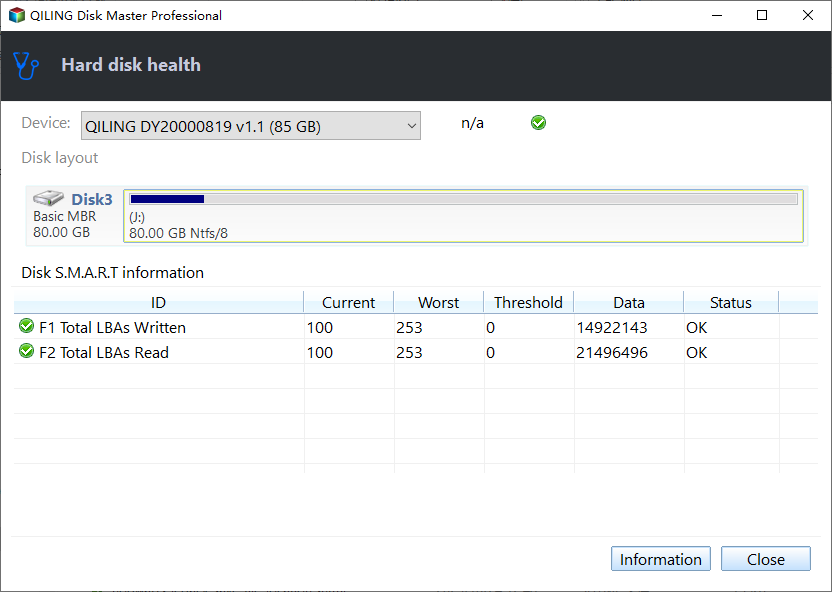
The software provides a DISK health program that monitors SSD temperature and checks hard drive health, also featuring SMART indicators to display the health status.
| Pros | Cons |
|---|---|
|
|
Download button:
Qiling Disk Master is an all-In the disk manager, you can resize partitions, create new ones, and even convert between different partition types. It also supports SSD 4K alignment, which can improve the performance of your solid-state drive. This feature ensures that your SSD is optimized for maximum speed and efficiency.
2. Crystal Disk Info
Crystal Disk Info is a free software for Windows and macOS that monitors hard drive health and performance in real-time, providing detailed information on temperature, transfer speed, and SMART attributes. It can also detect potential problems before they cause data loss, and is available in both standard and advanced versions with additional features.
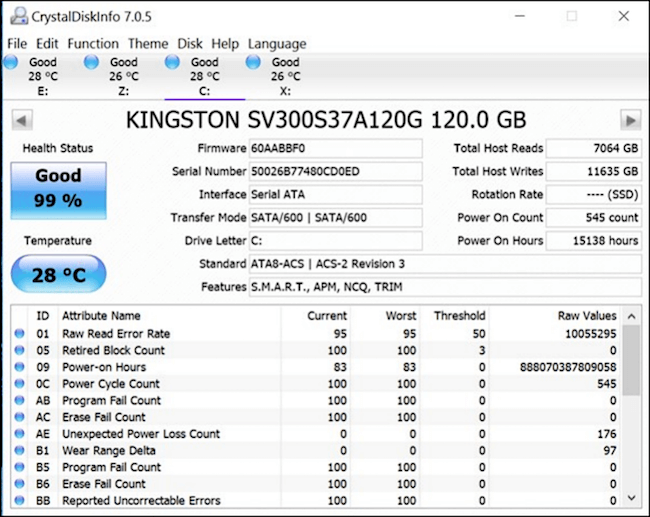
| Pros | Cons |
|---|---|
|
|
#Free Disk Monitor#SSD Temperature Monitor#SSD#Free
3. Core Temp
Core Temp is a free, lightweight software that monitors CPU temperature and other vital information about your computer's health. It supports both Intel and AMD processors, allowing you to monitor individual cores and threads of each processor. The software provides detailed information about each core and thread, including clock speeds and temperature, as well as a temperature graph over time.
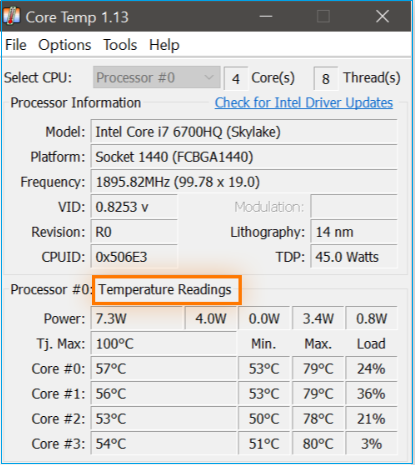
Core Temp is a tool that allows users to monitor their computer's temperature and other vital information, enabling them to ensure their computer runs at its optimal performance level. It has several customizable features that can be adjusted to suit individual needs and preferences. This makes it an excellent tool for those who want to keep their computer running smoothly and efficiently.
| Pros | Cons |
|---|---|
|
|
#Test SSD Temperature#SSD Temperature Monotor#Free#SSD
4. Hard Disk Sentinel
Hard Disk Sentinel (HDSentinel) is a disk monitoring software that tracks the health and performance of HDD and solid-state drives, detecting and reporting various indicators of drive reliability, including temperature, estimated lifetime remaining, and SMART attributes. It also alerts users to potential problems before they become serious, and is available in both free and paid versions for Windows, Linux, and macOS.
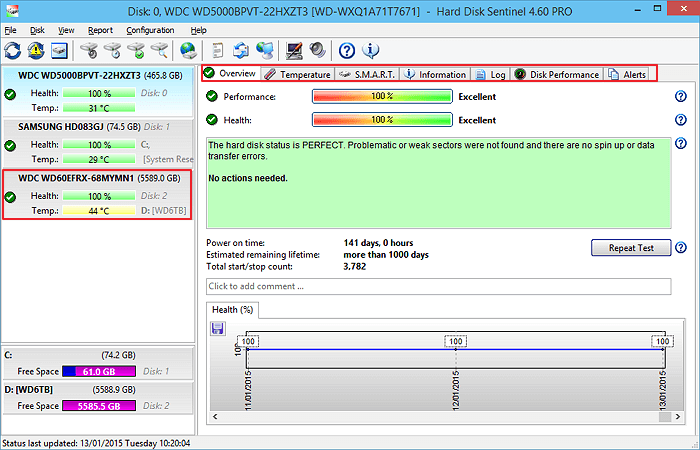
| Pros | Cons |
|---|---|
|
|
#Monitor Disk Temperature#SSD Temperature Monitor#Free
5. Samsung Magician
Samsung Magician is a software application that provides information about Samsung SSDs, optimizes performance, and monitors health, with features such as secure erase, firmware updates, and benchmarking.
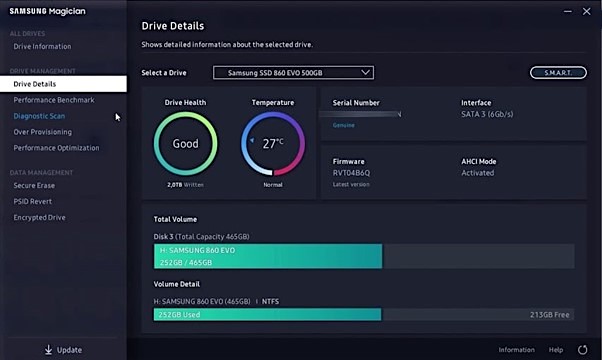
| Pros | Cons |
|---|---|
|
|
#Test SSD Temperature#Monitoring SSD Temperature#Free#Samsung
6. SSD-Z
SSD-Z is a free, open-source software that provides detailed information about installed SSDs, including hardware and software specs, performance metrics, and estimated remaining life. It can be used to compare SSDs and view technical details.
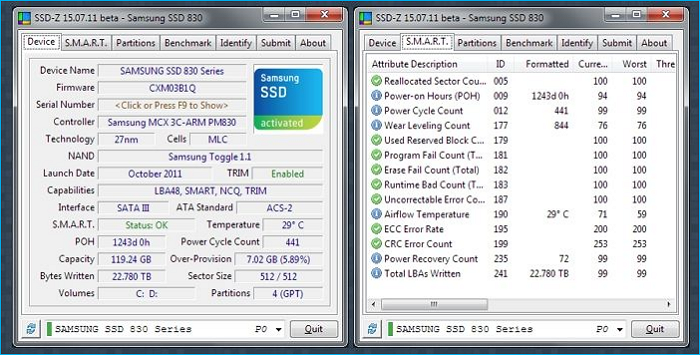
| Pros | Cons |
|---|---|
|
|
#Test SSD Temperature#Free#SSD
7. ADATA SSD Toolbox
ADATA SSD Toolbox is a free utility that allows users to monitor and manage their ADATA solid state drives (SSDs). It provides comprehensive features, including drive health, system information, firmware updates, secure data erasure, performance optimization, data backup and restore, and drive cloning, all in a user-friendly interface.
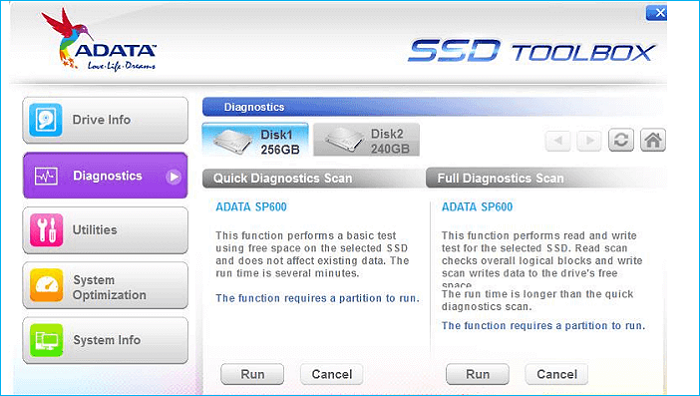
| Pros | Cons |
|---|---|
|
|
#Get SSD Temperature#SSD Temperature Monitor#Free
8. Open Hardware Monitor
Open Hardware Monitor is an open-source application that monitors computer components' temperature, fan speed, and voltages, including fan speed RPMs of modern video cards and SMART for hard drives, and can read temperatures from most Intel and AMD CPUs, available on Microsoft Windows and Linux with x86 and x64 architectures.

| Pros | Cons |
|---|---|
|
|
#Test Temperature of SSD#SSD#Free
Conclusion
The SSD Temperature Monitor Software monitors SSD health by detecting overheating and alerting users. It displays the SSD's current, maximum, and average temperatures, providing precise real-time data and an easy-to-use monitoring mechanism. Additionally, it allows users to set alarms for high temperatures, making it a reliable tool for maintaining SSD health.
Qiling Disk Master was the top choice for monitoring hard drive temperature, thanks to its extensive features, simplicity of use, and accurate temperature measurements. While CrystalDiskInfo and SSDLife were close runners-up, offering solid monitoring and warning systems, Qiling Disk Master's comprehensive capabilities made it the standout choice. Its ability to provide detailed information and timely warnings make it the top recommendation for checking hard drive temperature.
FAQs About SSD Temperature Monitor Software
Here are some more questions about SSD temperature monitor software. Hope it can be helpful to you.
1. How do I monitor my SSD temp?
To check the temperature of your SSD, you can use software like Qiling Disk Master. This tool allows you to monitor the temperature of your SSD occasionally. To use it, you can follow these steps: [insert steps here].
Step 1. Open Qiling Disk Master and activate "Disk Health."
Step 2. Select the target drive and click the refresh button.
2. What is an acceptable temperature for SSD?
The acceptable temperature range for an SSD is typically between 0°C to 70°C (32°F to 158°F), although this may vary depending on the manufacturer. It's best to check the manufacturer's guidelines for specific temperature ranges and monitor the SSD's temperature to ensure its longevity. Some SSDs are designed for high-temperature performance, while others are for general use.
3. Is 50c hot for SSD?
50c is not hot for an SSD, as most can operate between 0 and 70 degrees Celsius. However, using OEM software to control fan speed might be necessary if temperature monitoring software is not available.
Related Articles
- Do I Need to Backup OneDrive? [Why & How-to Guide]
- macOS Cannot Verify That This App Is Free from Malware [Error Solved]
- 8 Ways to Fix Windows 10 Error Code 0xC000000F in 2023
- 3 Steps: How to Fix PCL XL Error in Printer Windows 10/11